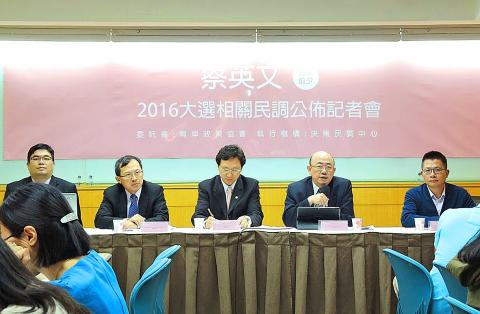Prior to Democratic Progressive Party Chairperson Tsai Ing-wen’s (蔡英文) trip to the US today, a survey released yesterday showed that 66.1 percent of Taiwanese believe that her policy of maintaining the “status quo” in cross-strait relations corresponds to the US’ cross-strait policy.
The poll released by the Cross-Strait Policy Association showed that only 13.2 percent of respondents held the opposite view.
Cross-Strait Policy Association president Tung Chen-yuan (童振源) said he expected the US would want Tsai to clarify her views on her “maintaining the status quo” remarks and to know how she would go about doing so.

Photo: CNA
The poll showed that 37.1 percent of respondents believe that her trip would not affect her presidential campaign, while 32.3 percent said it would.
The poll was conducted on Monday and Tuesday, with 1,171 valid samples from people randomly selected from telephone books.
The poll found that Tsai led over all her potential Chinese Nationalist Party (KMT) rivals, even in northern Taiwan — notably Taipei, New Taipei City and Keelung — which have traditionally been a stronghold for the pan-blue camp.
Whether against KMT Chairman Eric Chu (朱立倫) or Legislative Speaker Wang Jin-pyng (王金平), Tsai would win by a large margin, even in the north, the poll showed.
Facing Chu, Tsai would have 57.1 percent support over Chu’s 33.8 percent nationwide, while 14.2 percent of respondents said they were undecided. Against Wang, Tsai had the support of 51.3 percent of respondents nationwide, while Wang had 31.7 percent of the support, with 16.8 percent of the respondents saying they are still undecided, the poll found.
Breaking down the figures geographically, even in Taipei, New Taipei City and Keelung, Tsai garnered the support of 57.4 percent of respondents against Wang’s 28.4 percent; and when running against Chu — who is serving his second term as New Taipei City mayor — Tsai still has 52.1 percent of support against Chu’s 36.3 percent in the three cities, the poll found.
Jet-Go Consulting Group (戰國策顧問) chairman Wu Chun-cheng (吳春城) said the poll might indicate people are tired of the KMT.
“When Tsai first announced her presidential bid [last month], a poll conducted without identifying her rival showed that she only had a little over 30 percent support,” Wu said. “However, if you compare Tsai against other KMT rvials, she immediately has more than 50 percent support.”
“This shows that the 20 percent growth might come from people who simply do not like the KMT,” he said.

SECURITY: As China is ‘reshaping’ Hong Kong’s population, Taiwan must raise the eligibility threshold for applications from Hong Kongers, Chiu Chui-cheng said When Hong Kong and Macau citizens apply for residency in Taiwan, it would be under a new category that includes a “national security observation period,” Mainland Affairs Council (MAC) Minister Chiu Chui-cheng (邱垂正) said yesterday. President William Lai (賴清德) on March 13 announced 17 strategies to counter China’s aggression toward Taiwan, including incorporating national security considerations into the review process for residency applications from Hong Kong and Macau citizens. The situation in Hong Kong is constantly changing, Chiu said to media yesterday on the sidelines of the Taipei Technology Run hosted by the Taipei Neihu Technology Park Development Association. With

CARROT AND STICK: While unrelenting in its military threats, China attracted nearly 40,000 Taiwanese to over 400 business events last year Nearly 40,000 Taiwanese last year joined industry events in China, such as conferences and trade fairs, supported by the Chinese government, a study showed yesterday, as Beijing ramps up a charm offensive toward Taipei alongside military pressure. China has long taken a carrot-and-stick approach to Taiwan, threatening it with the prospect of military action while reaching out to those it believes are amenable to Beijing’s point of view. Taiwanese security officials are wary of what they see as Beijing’s influence campaigns to sway public opinion after Taipei and Beijing gradually resumed travel links halted by the COVID-19 pandemic, but the scale of

A US Marine Corps regiment equipped with Naval Strike Missiles (NSM) is set to participate in the upcoming Balikatan 25 exercise in the Luzon Strait, marking the system’s first-ever deployment in the Philippines. US and Philippine officials have separately confirmed that the Navy Marine Expeditionary Ship Interdiction System (NMESIS) — the mobile launch platform for the Naval Strike Missile — would take part in the joint exercise. The missiles are being deployed to “a strategic first island chain chokepoint” in the waters between Taiwan proper and the Philippines, US-based Naval News reported. “The Luzon Strait and Bashi Channel represent a critical access

Pope Francis is be laid to rest on Saturday after lying in state for three days in St Peter’s Basilica, where the faithful are expected to flock to pay their respects to history’s first Latin American pontiff. The cardinals met yesterday in the Vatican’s synod hall to chart the next steps before a conclave begins to choose Francis’ successor, as condolences poured in from around the world. According to current norms, the conclave must begin between May 5 and 10. The cardinals set the funeral for Saturday at 10am in St Peter’s Square, to be celebrated by the dean of the College